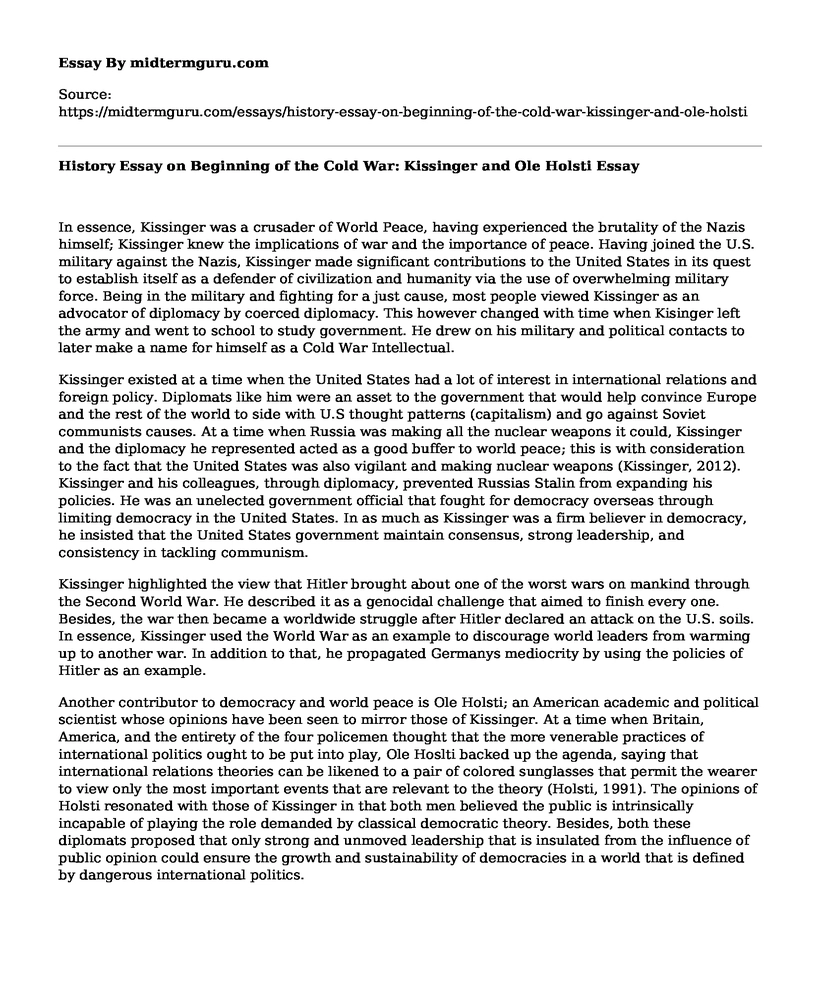In essence, Kissinger was a crusader of World Peace, having experienced the brutality of the Nazis himself; Kissinger knew the implications of war and the importance of peace. Having joined the U.S. military against the Nazis, Kissinger made significant contributions to the United States in its quest to establish itself as a defender of civilization and humanity via the use of overwhelming military force. Being in the military and fighting for a just cause, most people viewed Kissinger as an advocator of diplomacy by coerced diplomacy. This however changed with time when Kisinger left the army and went to school to study government. He drew on his military and political contacts to later make a name for himself as a Cold War Intellectual.
Kissinger existed at a time when the United States had a lot of interest in international relations and foreign policy. Diplomats like him were an asset to the government that would help convince Europe and the rest of the world to side with U.S thought patterns (capitalism) and go against Soviet communists causes. At a time when Russia was making all the nuclear weapons it could, Kissinger and the diplomacy he represented acted as a good buffer to world peace; this is with consideration to the fact that the United States was also vigilant and making nuclear weapons (Kissinger, 2012). Kissinger and his colleagues, through diplomacy, prevented Russias Stalin from expanding his policies. He was an unelected government official that fought for democracy overseas through limiting democracy in the United States. In as much as Kissinger was a firm believer in democracy, he insisted that the United States government maintain consensus, strong leadership, and consistency in tackling communism.
Kissinger highlighted the view that Hitler brought about one of the worst wars on mankind through the Second World War. He described it as a genocidal challenge that aimed to finish every one. Besides, the war then became a worldwide struggle after Hitler declared an attack on the U.S. soils. In essence, Kissinger used the World War as an example to discourage world leaders from warming up to another war. In addition to that, he propagated Germanys mediocrity by using the policies of Hitler as an example.
Another contributor to democracy and world peace is Ole Holsti; an American academic and political scientist whose opinions have been seen to mirror those of Kissinger. At a time when Britain, America, and the entirety of the four policemen thought that the more venerable practices of international politics ought to be put into play, Ole Hoslti backed up the agenda, saying that international relations theories can be likened to a pair of colored sunglasses that permit the wearer to view only the most important events that are relevant to the theory (Holsti, 1991). The opinions of Holsti resonated with those of Kissinger in that both men believed the public is intrinsically incapable of playing the role demanded by classical democratic theory. Besides, both these diplomats proposed that only strong and unmoved leadership that is insulated from the influence of public opinion could ensure the growth and sustainability of democracies in a world that is defined by dangerous international politics.
References
Holsti, K. J. (1991). Peace and war: Armed conflicts and international order, 1648-1989 (Vol. 14). Cambridge University Press.
Kissinger, H. (2012). Diplomacy. Simon and Schuster.
Cite this page
History Essay on Beginning of the Cold War: Kissinger and Ole Holsti. (2021, Jun 04). Retrieved from https://midtermguru.com/essays/history-essay-on-beginning-of-the-cold-war-kissinger-and-ole-holsti
If you are the original author of this essay and no longer wish to have it published on the midtermguru.com website, please click below to request its removal:
- How Process of Writing History Affects Abina and the Important Men
- Essay on the United States History
- Essay Example: Can the World Resolve the Problem of Genocide?
- Policy Analysis: Juvenile Diabetes
- Paper Example on Civil Rights in Black and Brown Project
- US Immigration Crisis: Policy Strategies & Solutions - Essay Sample
- Eastern Coalition Victory Over Ottoman Empire: Outcomes and Implications - Essay Sample







